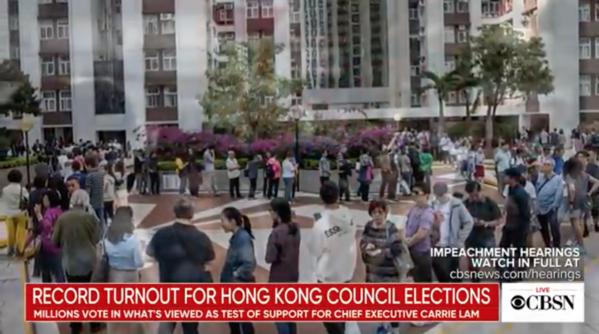Hong Kong voters deliver landslide rebuke to Beijing and Xi
The people of Hong Kong have let the world know that they overwhelmingly back the democracy movement that has convulsed the city for months and cost countless businesses serious money. Instead of weariness and anger against the disruptors, the 3 million voters who went to the polls supported anti-establishment candidates.

YouTube screen grab.
The New York Times:
With three million voters casting ballots, pro-democracy candidates captured 389 of 452 elected seats, up from only 124 and far more than they have ever won. The government's allies held just 58 seats, a remarkable collapse from 300. (snip)
The elections were for district councils, one of the lowest elected offices in Hong Kong, and they are typically a subdued affair focused on community issues. The job mostly entails pushing for neighborhood needs like bus stops and traffic lights.
But this election took on outsize significance, and was viewed as a referendum on the unrest that has created the city's worst political crisis in decades. In a semiautonomous part of China where greater democracy is one of the protesters' biggest demands, it gave residents a rare chance to vote.
The gains at the ballot box are likely to embolden a democracy movement that has struggled with how to balance peaceful and violent protests to achieve its goals.
Gordon Chang points out that this embarrassment for Beijing could weaken the hand of Xi Jinping:
This defeat for #XiJinping is so bad that his opponents in Beijing will certainly use it against him. He is already weakened, and this will intensify the infighting. #HongKong #China #DistrictCouncilElection https://t.co/WOltC9Kvoz
— Gordon G. Chang (@GordonGChang) November 24, 2019
Xi faces multiple crises, and while he has purged many potential rivals under the guise of an "anti-corruption campaign," members of the Politburo of the Chinese Communist Party — which controls the entire country — are already suffering thanks to President Trump's trade war, which is costing the many newly minted billionaires financially. These elites also rely on Hong Kong as a means of getting some of their money out of China. The hard-line treatment (as in concentration camps on a vast scale) of China's Uighur Muslim minority in Xinjiang is also weakening China's international stature ad appeal. An emerging spy scandal in Australia is not helping matters, either.
Things could heat up under Xi in Beijing, with him getting blamed for badly handling multiple challenges. The inner workings of China's real power structure in the Communist Party are not visible to outsiders, but even with the lifetime tenure he had himself granted, Xi Jinping's hold on power is far from assured. While this could strengthen President Trump's hand in extracting concessions from Chine on trade, if Xi gets tossed out, his replacement could be even more hard-line. That would be a setback not just for the U.S., but for China's attempt to further integrate itself into the world order via its Belt and Road initiative.
From the outside, China often appears to be a massive and stable dictatorship. But its political system, while authoritarian, does not have robust mechanisms for handling policy disagreements. And while national pride and redemption from the humiliation China received at the hands of the West ever since the Opium Wars are powerful political sentiments, China's regime is not beloved of the people, who resent its corruption and heavy-handedness, even while giving it credit for the huge boost in the standard of living of most Chinese, especially those in coastal areas.
China's leaders never forget the brittleness of their hold on power. Neither should we.
FOLLOW US ON
Recent Articles
- Can Trump Really Abolish the Department of Education?
- Carney’s Snap Election -- And Trump Saw It Coming
- We Can Cure Democracy, But Can We Cure Stupid?
- George Clooney: Master of Cringe
- Malicious Imbeciles
- Face the Nonsense, Again: Margaret Brennan’s ‘You Should Watch the News’ Moment
- Public School Teachers: The Stupidest Creatures on the Planet
- The Activist Judges Who Think They Outrank the President
- Dismantling USAID Services in Africa
- There Are EVs And There Are Teslas. They Are Not The Same.
Blog Posts
- Hegseth boards plane flanked by two ‘bada**’ women, and the politically correct capitulation tour continues
- Payback: J.D. Vance calmly gives Denmark a real reason to be paranoid since they're asking for it
- Political shenanigans in Texas
- Jasmine Crockett tries to backpedal her ‘hot wheels’ comment about a wheelchair-bound Gov. Abbott, forgets the internet archives exist
- Signal debacle – maybe intentional
- Trump’s executive orders have big leftist law firms running scared
- In Denmark, Americans have become 'the deplorables'
- Mike Huckabee and a turning point in US-Israel relations
- Up is down, down is up!
- Who will thaw the Arctic?
- Do trans people expect us to abandon common sense?
- Impeach the judges
- How Mississippi eliminated the income tax
- The ‘agua’ battle on the border
- Rep. Jasmine Crockett mocks Texas's wheelchair-bound governor Abbott as 'Gov. Hot Wheels,' then keeps digging






